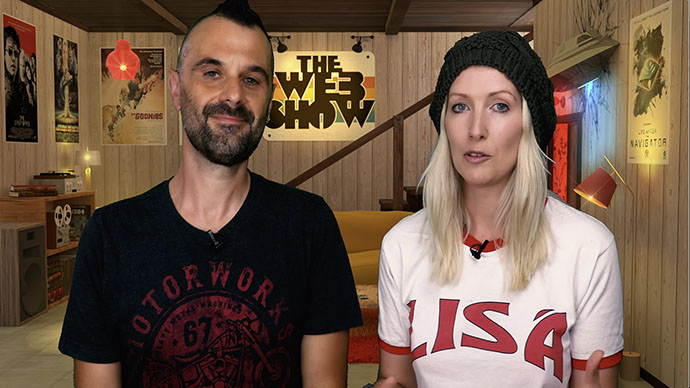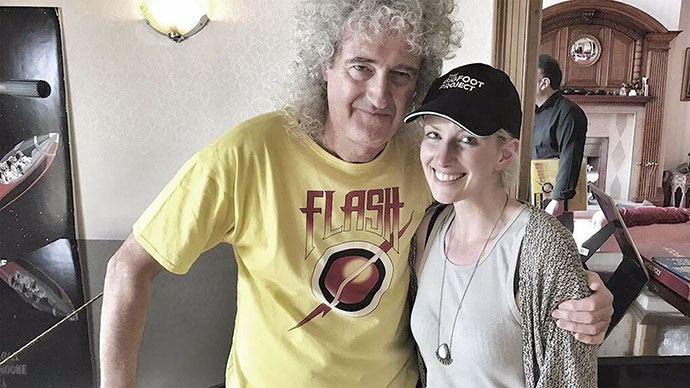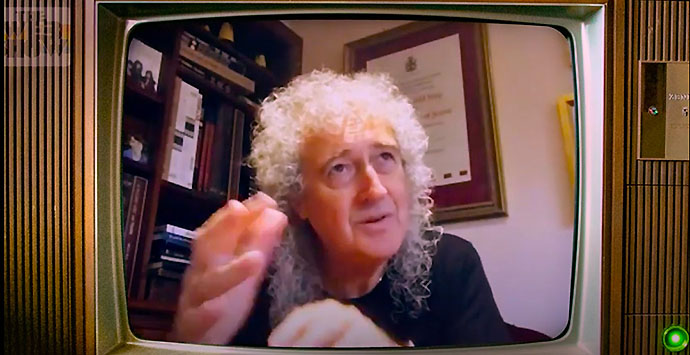TRANSCRIPT here of Brian’s fascinating interview with Ashley Pugh and Lisa Downs of The Web Show, discussing The StudioCanal 40th Anniversary re-release of Flash Gordon, which is out now on Blu-ray and DVD. Enjoy.
BRIAN MAY talks Flash Gordon, Brian Blessed, QUEEN, astrophysics & more!
– https://youtu.be/42rYz47438c
TRANSCRIPT J TUNNEY – E&OE
PART ONE
Okay, we’re going for a take. Let’e have quiet please and roll the film. Check headsets. We’re on standby and start recording.
EMPEROR MING: Klytus, I’m bored. What plaything can you offer me today?
KLYTUS: An obscure body in the S-K system, your Majesty. The inhabitants refer to it as the planet… Earth.
MING: How peaceful looks.
KLYTUS: Most effective, your Majesty! Will you destroy this – Earth?
MING: Later. I like to play with things a while.

LISA: I can’t actually believe we’re going to announce our guest for today’s show.
ASH: What an episode we have for you lovely people. Prepare to get your minds just literally blown.
LISA: Uh Brian May.
ASH: I mean, what more can you say. He is a legend, arguable the best, if not one of the best guitarists in the world and also an incredibly lovely man – Invited us into his home. We sat playing the Flash Gordon pinball machine with him. Lisa would like have a game of pinball with him.
LISA: This was to interview him for “Life After Flash”.I guess we’ll just get straight into it.

ASH: Let’s not hold things up, people – Brian May.
LISA: The absolutely incredible Brian May is kind enough to chat with us on The Web Show today. Big part of “Life After Flash” wouldn’t have been the same documentary without his involvement and of course the 40th Anniversary re-releases of “Flash Gordon” in 4k are all coming out. So thank you Brian for chatting with us today.
BRIAN MAY: It’s such a pleasure. Good to see you guys again.
ASH: Looking back now 40 years ago when you were sat there at your piano sort of putting that together, did you have any idea that it was going to become one of the most kind of enduring rock and roll movie soundtracks ever?
BRIAN: No, I had no idea whatsoever, but I did have hopes because they were saying to us at the time, “Well obviously the uh scoring will have to be done by the orchestra guy”, you know. That’s what movies are. They have to have orchestra underscores and I was thinking, “No, perhaps they don’t”. You know, if we could actually do this in a kind of rock style, it, it could really break some barriers down and, and all through it, people will say, “No it’s probably not going to work”. And I was determined that not only would we do kind of highlights but we do atmosphere and we would we would be an organic part of the film, and I think it’s the first time it was ever done, and I’m immensely happy that, that it’s become sort of part of folklore. One of those things that people think was always there, and of course not. movie soundtracks area all guitars and drums and heavy metal and stuff. It’s funny how things have changed.
The only place, the only other place I saw it explored in the early days was in the Japanese cartoon science fiction things like “Star Fleet” and I was very close to … and did my own version of that.
[Music] – shows “Star Fleet” clip
But Flash to me is – I’m so glad that it’s become an icon, because I think it’s worthy. I think the film is worthy and I think what we did as precocious kids is worthy too.
ASH: Why do you think people still hold onto this film so fondly?
BRIAN: I think it sits nicely on the edge. I think it has that lovely element of tongue-in-cheek and conscious retro style, but also it has this undertone of, of real adventure. I think it’s lovely. I think it’s a beautifully honest kind of film and a lot of that’s due to Mike Hodges, the director, of course, but it was very well cast. All the actors are very ‘comic book’ and the bad guys are really bad, you know, in a comic book kind of way. The good guys are really – you know, Sam is amazing as Flash, you know, completely innocent as the guy is I think, you know. It was very well cast and very well handled, The music is – uh – okay.
[Laughter]
LISA: When we spoke, and you’ve spoken a lot about this before, the idea of the thunder and the lightning as being part of the theme song and you had that kind of “dum-dum-dum” in your head”, from that moment, how long did it actually take for you to complete the song?
BRIAN: Not too long actually. We did it all in a rush because we were involved in a different project at the time. We were trying to make an album in Munich, so we were going backwards and forwards, and in the end I was kind of marooned in London, finishing everything off while the guys were in Munich finishing off the Queen album. So didn’t take too long and actually the end credits were thrown together in less time than it takes for you to hear it, almost, because, you know, it was like we need it tonight and so we, I just piled in and stitched a lot of bits together including a lot of, of Howard’s nice orchestral pieces. That was a nice sort of bringing together.
But the ‘Flash’ single – of course, there are various versions, you know – one for the movie, one for the single, and then a sort of rehash of it as part of the end sequence – didn’t take too long. We were in Townhouse and – its funny, if you have a clear idea in your head of where you’re going, it doesn’t take too long to do these things. I remember we did, we stacked our armies on the “Flash” thing. You know that it’s a six or seven harmony there…
[Music]
… and it happened very quickly and it sounds just right – has the right kind of razor edge to it. When we tried to reproduce it for the end credits, it just didn’t work. It’s like the moment had gone, and so I had to steal them and sync ‘em on for the album version of the end credits. But when you watch the film, the end credits have the really bad version in there because there was no time. [Laughs]

ASH: I’ve got visions in my head. I’ve watched “Bohemian Rhapsody” recently, which was brilliant – loved it – and that scene, the experimentation of you all like throwing speakers on wires backwards, forwards, and I’ve got this vision in my head of you kind of – ‘cos it was so experimental, what you were doing musically back then, wasn’t it to kind of create these sounds that had never been done before?
BRIAN: It was, it was pretty much the first time that we seriously used synthesizers at all because up to then we used this little note on the album saying “No synthesizers” because people had thought that our guitar harmonies and vocal harmonies were synthesizers, we wanted to make sure that people realized it was just us. This time, for ‘Flash’, it was an invitation and actually Roger had this wonderful machine called an OBX, and it was just perfectly suited to making these kind of space noises. So we dived into the synthesizer world for ‘Flash’, and of course we never, we never came out, you know. Now we embrace these things. There’s nothing like a guitar and a voice, you know, to do things which are emotional, but the synthesizers can do certain wonderful things, and so we welcome them as part of the tapestry of life now.
LISA: When you watch the theme, the music video for the theme, it shows you playing along to clips of the film, that was reflective of the actual recording process, wasn’t it?
BRIAN: Absolutely. It’s very old school and, of course, it doesn’t happen now because we have digital and people can do it in their homes. In those days you went into a film studio, set up your gear, and there was this giant screen on the wall, and every time there was a hit coming up, you would get a wipe, and it would start on the right and go… [makes a noise]…. across to the left, and by the time you got to the left you had to make your hit, so we were absolutely synced up in a very organic way, very old fashioned way, the same as they made “Gone With The Wind” and everything soundtrack and it was great. I’m glad that it happened that way, because these days you would never have that experience in quite the same way.
Course you can slide stuff around nowadays. In those days it was all sprockets. You don’t have even a normal tape machine. All the vision and all the sound, all the sound effects, the music, the dialogue, are all on sprocket machines, so if you want to slide something about, you have to slide it by one sprocket hole, which is a little unsatisfactory in many ways so basically you’ve got to get it right first time. You’ve got to play it organically to the track and then it will forever be locked in.
ASH: Amazing. Are there any sort of particular fond memories you have of the recording process of doing the film? Is there any kind of thing where you just think, “I remember that wonderful moment when”?
BRIAN: Curiously one of my favourite moments is a very small one when you’re halfway through the battle sequence and you see a kind of bank of clouds, and out of it comes Ming’s flying machine and “bum, bum bum bum bum” going, you know, and I remember trying to find a suitable phrase that would express this dangerous machine coming out of the clouds.
[Music]
BRIAN: … and all of those little things were done live, as I say, so that was, that’s my favourite thing.. I think that’s what I’m most fond of and most proud of those moments where you actually are wedded unto the action by the music – welded into the action – not witted but welded into the action.
LISA: What would you say was your biggest challenge for the score?
BRIAN: Biggest challenge was probably getting Dino de Laurentiis on board because he was the – he’s the man in charge. He’s the creator of the the whole thing. He’s the producer and a hugely successful Italian producer, made giant epic movies like the remake of “King Kong”, and when he first heard the music – I think I’ve told this story before – but he wasn’t convinced. He saw this film as something rather serious and dramatic and he found the music that we had created I suppose too comic book. He didn’t want that tongue to be in the cheek. He wanted it to be all serious and what had, what happened, was Mike – I remember it as clear as day – he put – ‘cos I was a little upset you know… We played him ‘Flash’ and he goes: “It’s, it’s nice music, but it’s not for my film – and Mike put his hand on my arm and said, “Don’t worry, I’ll sort it”. So I think Mike and Dino went away and had a chat and Mike convinced him that we were going in the right direction and his film was going to be safe. In the end he loved it, so it turned out great. He was very happy and he came and thanked us, so it was a good feeling in the end. But, yeah, it was tough. It was a challenge to sort of keep the faith and I would have been massively disappointed if the ‘Flash’ thing hadn’t worked because to me that was going to be the linchpin of what we were doing.
==========